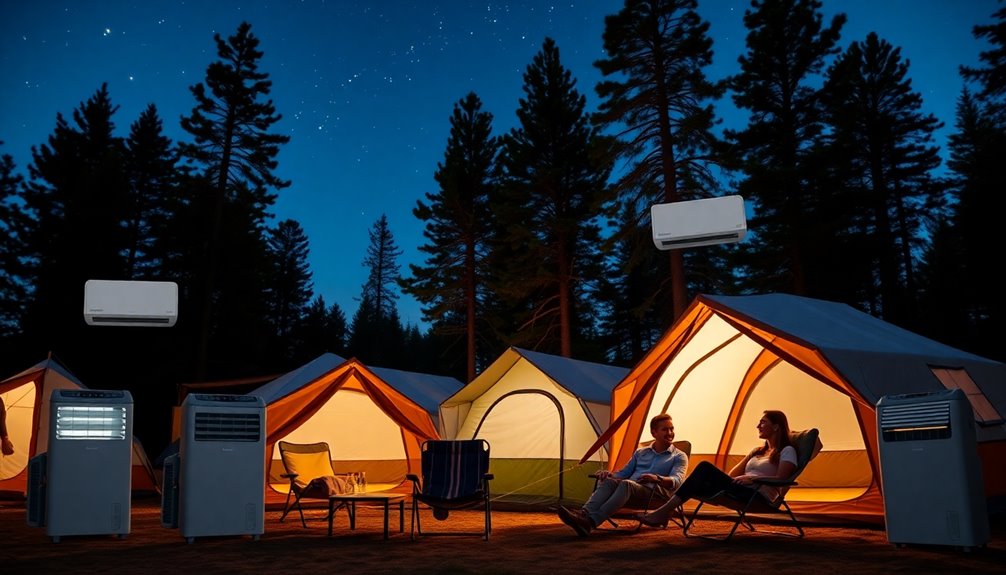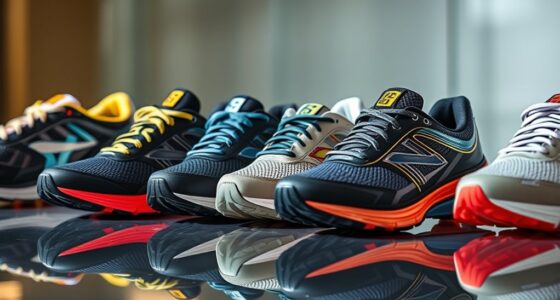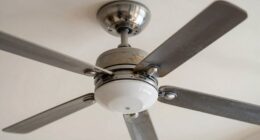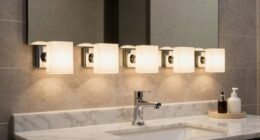In 2025, I've discovered the 15 best tent air conditioners to keep your camping experience cool and comfortable. These portable units offer various cooling capacities, low noise levels, and energy-efficient options perfect for tents. Models like the EF ECOFLOW Wave 2 and EnjoyCool 2380BTU provide quick temperature adjustments and are lightweight for easy transport. You'll love features like dehumidifying functions and multiple cooling settings. Plus, they suit diverse outdoor conditions. If you're looking for the ideal air conditioner for your next camping trip, you'll want to check out which models made the list! Many of these options also double as the best personal air conditioners, making them versatile solutions for both individual and group use. Whether you’re camping in humid forests or arid deserts, these units are designed to combat extreme temperatures effectively. With their compact designs and rechargeable battery options, they are a game-changer for outdoor enthusiasts who value both convenience and comfort.
Key Takeaways
- Portable air conditioners designed for camping effectively cool tents and RVs, with capacities ranging from 1,500 to 5,200 BTUs.
- Key features include low noise levels, multiple cooling modes, and energy efficiency, enhancing comfort during outdoor activities.
- Popular models like the EF ECOFLOW Wave 2 and EnjoyCool 2380BTU offer quick temperature adjustments and versatile power options.
- Consider lightweight options weighing as little as 11.5 lbs for easy transport, especially for small groups or solo camping trips.
- Budget for upfront costs between $350 to $540, while energy-efficient units can lower overall electricity expenses.
Evapolar evaCHILL Portable Air Conditioner
If you're someone who enjoys camping but struggles with the heat, the Evapolar evaCHILL Portable Air Conditioner might just be your best ally. This compact, lightweight unit is perfect for keeping your personal space cool, especially in those hot, dry climates. With its four adjustable fan speeds, I can easily customize my comfort level, and using ice-cold water in the tank definitely amps up the cooling effect. The water lasts for about 5-7 hours, so I don't have to worry about constant refills. However, it's important to remember it's designed for small areas, cooling effectively up to 10×10 feet. While some users have reported noise and durability issues, I find its convenience and energy efficiency well worth it for my camping adventures.
Best For: Individuals who need a portable cooling solution for small spaces during camping or in hot, dry climates.
Pros:
- Energy-efficient design, consuming only 10W, ideal for off-grid use.
- Compact and lightweight, making it easy to transport and set up anywhere.
- Adjustable fan speeds and the option to use ice-cold water enhance cooling performance.
Cons:
- Limited cooling range, best suited for small areas and not effective in high humidity.
- Reports of noise levels being disruptive, especially at higher fan settings.
- Potential durability issues with electrical components and water leaks over time.
BLACK+DECKER 3-in-1 Personal Portable Air Conditioner
The BLACK+DECKER 3-in-1 Personal Portable Air Conditioner stands out as an ideal choice for campers seeking efficient cooling in tight spaces. With a 1000 BTU rating and multiple functions as an air conditioner, dehumidifier, and fan, it efficiently cools areas up to 225 sq ft. I love the ease of installation—just about ten minutes—and it doesn't require window installation, making it perfect for tents. Its compact design and dual exhaust hoses help direct warm air outside. Although it does produce noticeable noise, I recommend running it for a couple of hours before sleeping. Overall, this unit's performance is impressive, and I'd definitely consider getting another for additional personal spaces.
Best For: The BLACK+DECKER 3-in-1 Personal Portable Air Conditioner is best for individuals seeking effective cooling solutions in small, personal spaces such as tents or small rooms.
Pros:
- Versatile functionality: Serves as an air conditioner, dehumidifier, and fan.
- Easy installation: Quick setup in about ten minutes without requiring window modifications.
- Compact and mobile: Designed for personal use with casters for easy movement.
Cons:
- Noticeable noise: Some users find it too loud for nighttime operation.
- Limited cooling area: Not suitable for large rooms, with optimal performance in spaces up to 225 sq ft.
- Remote control issues: Some complaints about the functionality of the remote control.
Arctic Air Pure Chill 2.0 Evaporative Air Cooler by Ontel
For campers seeking a lightweight and portable cooling solution, the Arctic Air Pure Chill 2.0 Evaporative Air Cooler by Ontel stands out with its compact design and Hydro-Chill Technology. Weighing just 1.89 pounds, it's easy to pack and set up wherever I need a breeze. The dual cooling jets and evaporative cartridge effectively cool and humidify the air, making it perfect for hot summer nights in the tent.
With a top-fill tank capacity of 0.55 liters, it runs for up to 10 hours, depending on the speed setting. The whisper-quiet operation won't disturb my sleep, and the multi-directional air vents allow for customizable airflow. Plus, the built-in LED night light adds a cozy touch to my camping experience.
Best For: Those seeking a lightweight and portable cooling solution for personal use in small spaces or while camping.
Pros:
- Compact and lightweight design makes it easy to carry and set up anywhere.
- Hydro-Chill Technology effectively cools and humidifies the air for enhanced comfort.
- Whisper-quiet operation ensures minimal disturbance during use, perfect for sleeping.
Cons:
- Not a substitute for full air conditioning, primarily cooling only the area directly in front.
- Some users reported issues with power cords, which could affect reliability.
- Noise can be noticeable at higher settings, potentially disruptive for light sleepers.
BLACK+DECKER 8,000 BTU Portable Air Conditioner with Remote Control
Looking for a reliable way to stay cool during your camping trips? The BLACK+DECKER 8,000 BTU Portable Air Conditioner with Remote Control might be just what you need. It suits spaces up to 350 sq. ft., making it perfect for larger tents. This versatile unit not only cools but also dehumidifies and functions as a fan, giving you multiple options to beat the heat. I love the adjustable temperature settings, and it even shuts off when the desired temperature is reached, saving energy. Plus, its mobility is a huge plus, thanks to the casters and handles. Just keep an eye on water drainage, and you'll enjoy a comfortable, cool camping experience all summer long!
Best For: Those seeking a versatile and portable cooling solution for small to medium-sized spaces, such as campers or larger tents.
Pros:
- 3-in-1 functionality allows for cooling, dehumidifying, and fan operation.
- Energy-efficient with adjustable temperature settings that shut off when desired levels are reached.
- Easy mobility with built-in casters and side handles for convenient transport.
Cons:
- Requires frequent water drainage during operation, especially when used for heating.
- Some users report leakage from exhaust tubes, requiring careful management.
- Installation may be necessary with a window kit, which could be a hassle for some users.
Portable Air Conditioner for Tent (1,500 BTU)
If you're camping in sweltering heat and need a personal cooling solution, the 1,500 BTU portable air conditioner is a game-changer for small tents. Designed for spaces up to 50 sq. ft., this unit offers both cooling and fan modes, circulating air at 140m³/h. I found it easy to transport, thanks to its compact size and single-hand handle. While it cools effectively, expect a temperature drop of about 5 degrees, especially if you direct the airflow towards yourself. Just keep in mind it requires proper setup for efficiency, with the exhaust pipe placed outside. Some condensation management issues exist, so confirm it's level and check for drainage. Overall, it's a solid investment for hot-weather camping.
Best For: This portable air conditioner is best for campers seeking a personal cooling solution in small tents during hot weather.
Pros:
- Easy to transport with a compact design and single-hand handle.
- Multi-functional with both cooling and fan modes for versatile use.
- Energy-efficient and operates quietly, making it suitable for small spaces.
Cons:
- Limited cooling effectiveness, with only a 5-degree temperature drop.
- Condensation management issues, requiring manual drainage and proper leveling.
- Setup complexity, needing correct placement of exhaust and intake for optimal performance.
Portable Air Conditioner for Camping
Camping enthusiasts searching for a way to beat the heat will find the portable air conditioner for camping to be an ideal solution. With a powerful 5200 BTU cooling capacity, this compact unit effectively cools spaces up to 60 square feet. Weighing only 52 pounds and measuring 21x14x12 inches, it's easy to transport. Plus, it runs on both 12V DC and 110V AC, making it versatile for tents, RVs, or even your pet's house. I appreciate its low energy consumption and quiet operation, which keeps noise levels under 50dB(A). Setup is straightforward, and the included power inverter lets you connect to a battery or power bank. Whether summer or chilly nights, this unit has you covered!
Best For: Camping enthusiasts looking for an efficient, portable cooling solution for tents, RVs, and other outdoor spaces.
Pros:
- Portable and compact design makes it easy to transport and set up in various locations.
- Low noise level (≤50dB(A)) ensures a quiet environment for relaxation and sleep.
- Dual power options (12V DC & 110V AC) provide versatility for different power sources.
Cons:
- Cooling capacity limited to spaces up to 60 square feet, which may not be sufficient for larger areas.
- Weight of 52 pounds might be cumbersome for some users when transporting.
- Suggestions for a longer flexible hose may be necessary for noise-sensitive users during operation.
Camping Air Conditioner, Portable Mini Air Conditioner for Tent and RV
When I think of the best tent air conditioners for camping, the portability and lightweight design of the mini air conditioner immediately stand out. Weighing just 11.5 pounds and measuring 9.5 by 13.8 inches, it's easy to pack and set up. With a cooling capacity of 2000 BTU, it effectively cools tents for 1-3 people, dropping temperatures by 10°F in shaded areas. It offers six adjustable modes, including sleep and dehumidification, which is perfect for those sensitive to noise, with a sound level of only 49 dB. Its 1.2L water tank operates for up to 18 hours, depending on humidity. Plus, with a remote control and a 1-year warranty, it's a smart choice for any camping trip.
Best For: This portable mini air conditioner is best for campers and outdoor enthusiasts seeking an efficient, lightweight cooling solution for small tents or RVs.
Pros:
- Lightweight and portable design, making it easy to transport and set up.
- Low noise level at 49 dB, suitable for users sensitive to sound during sleep.
- Multiple cooling modes including dehumidification, catering to various needs and preferences.
Cons:
- Limited cooling capacity may not suffice for larger tents or extreme heat conditions.
- Water tank capacity of 1.2L requires frequent refilling in high humidity.
- Power supply options are limited, needing additional cables for certain uses.
EF ECOFLOW Wave 2 Portable Air Conditioner
The EF ECOFLOW Wave 2 Portable Air Conditioner stands out as the best choice for campers who prioritize both cooling and heating capabilities in a compact design. With a cooling capacity of 5,100 BTU and heating at 6,100 BTU, it quickly adjusts temperatures, dropping them by 18°F in just five minutes. Weighing only 32 lbs, it's easy to transport, and its no-installation setup means I can use it right away. Plus, the swappable battery option lets me charge it via AC, solar, or car, extending run times considerably. I appreciate the quiet operation at 44 dB in Sleep Mode, making it perfect for nighttime use. Overall, the Wave 2 delivers excellent performance for any camping trip.
Best For: Campers and outdoor enthusiasts seeking a versatile and portable air conditioning solution with both cooling and heating capabilities.
Pros:
- Compact and lightweight design (32 lbs) for easy transport and setup.
- Quick temperature adjustment, dropping by 18°F in just five minutes.
- Quiet operation at 44 dB in Sleep Mode, ideal for nighttime use.
Cons:
- Requires drainage in high humidity conditions (70%+).
- May need an add-on battery for extended run times beyond 8 hours in Eco Mode.
- Performance may vary in extremely high temperatures, necessitating careful positioning for optimal cooling.
Portable Air Conditioner for Outdoor and Home Use
If you're looking for a reliable way to beat the heat during your outdoor adventures, this portable air conditioner is a game changer. Weighing just 14.3 lbs and featuring compact dimensions, it's easy to transport for camping, RV trips, or even home use. With a cooling capacity of 2380 BTU, it quickly lowers temperatures from 89℉ to 75℉ in just one hour, making it perfect for spaces up to 43 sq. ft. I love the smart display and remote control, which let me adjust settings effortlessly. The sleep mode runs at a whisper-quiet 43dB, ensuring a peaceful night. Plus, its versatility makes it an excellent backup during power outages. This unit truly enhances my outdoor experience!
Best For: Individuals seeking a compact and portable cooling solution for outdoor activities, camping, RVs, or as a backup air conditioner for home use. Best For: Individuals seeking a compact and portable cooling solution for outdoor activities, camping, RVs, or as a backup air conditioner for home use. These units are known for their efficiency and ease of use, making them a top choice for on-the-go cooling needs. For those in search of maximum performance and energy savings, some of the best dual hose portable AC units offer superior cooling power while effectively minimizing hot air intake, ensuring a comfortable environment even in extreme heat. They are an excellent investment for anyone looking to stay cool without the bulk of traditional air conditioning systems.
Pros:
- Low power consumption at 240W, making it energy-efficient.
- Whisper-quiet sleep mode operates at 43dB, ideal for nighttime use.
- Versatile use for various environments including tents, trucks, and indoors.
Cons:
- Limited cooling capacity for larger spaces, effective only up to 43 sq. ft.
- Weight of 14.3 lbs may be cumbersome for some users during transport.
- Cooling performance may vary in extreme heat conditions.
EnjoyCool Portable Air Conditioner for Camping
For anyone looking for a portable air conditioner that won't weigh down their camping gear, the EnjoyCool 2380BTU model stands out. Weighing only 6.5 kg (14 lbs), it's incredibly lightweight and easy to transport. With a cooling capacity of 2380 BTU, it cools spaces down to 30-40°F in just 10 minutes, making it perfect for hot summer nights. The four cooling modes—speed, strong, sleep, and fan—allow for customizable comfort, all controlled via a remote or an LCD smart touch panel. While it's not designed for large areas, it excels in small spaces like tents or RVs. Plus, its Energy Star certification means it's efficient. With a 30-day return policy, you can try it risk-free on your next camping trip!
Best For: Those seeking a lightweight and efficient portable air conditioner for camping or small spaces.
Pros:
- High cooling efficiency, rapidly lowering temperatures to 30-40°F in just 10 minutes.
- Portable design makes it easy to transport and set up in various outdoor locations.
- Energy Star certified, ensuring energy efficiency and cost savings on electricity.
Cons:
- Limited cooling capacity makes it unsuitable for large rooms or open areas.
- User-reported issues with the ambient sensor affecting performance in certain conditions.
- Sound levels may be noticeable, ranging from 43-52 dB, which could be disruptive in quiet settings.
EF ECOFLOW Wave 2 Portable Air Conditioner
Looking for a powerful solution to beat the heat while camping? The EF ECOFLOW Wave 2 Portable Air Conditioner might be what you need. With its impressive cooling and heating capabilities, it can drop or raise temperatures by 18℉ in just five minutes. I love that it offers four charging options, including solar, which makes it versatile for outdoor adventures. Plus, it runs quietly at 44 dB in Sleep Mode, perfect for a peaceful night. However, I've noticed some users report limited battery life, with only about four hours of cooling on a full charge. Despite some mixed reviews, especially regarding heating performance, I believe it's a solid choice if you're looking for portable comfort during your camping trips.
Best For: The EF ECOFLOW Wave 2 Portable Air Conditioner is best for campers and outdoor enthusiasts seeking a powerful and versatile cooling and heating solution.
Pros:
- Offers rapid temperature adjustment, cooling or heating by 18℉ in just five minutes.
- Four charging options, including solar, enhance its portability for outdoor use.
- Quiet operation at 44 dB in Sleep Mode ensures undisturbed nights.
Cons:
- Limited battery life, with some users only experiencing about four hours of cooling on a full charge.
- Mixed reviews on heating effectiveness, particularly in cooler temperatures.
- The unit is reported to be bulky and heavy, making transportation more challenging.
2380BTU Portable Camping Air Conditioner
The 2380BTU Portable Camping Air Conditioner stands out as an ideal choice for campers seeking efficient cooling in small spaces like tents or RVs. Weighing just 14.3 lbs, its compact size (20.79 x 9.76 x 10.15 inches) makes it easy to transport. With a cooling capacity of 2380 BTU, it can cool an area up to 43 sq. ft., reducing temperatures from 89℉ to 75℉ in just an hour. I love the multi-mode options, including a quiet sleep mode at 43 dB, making it perfect for nighttime. The remote control and adjustable air vent add convenience. While it's best for small areas, it's a reliable choice for camping, fishing, or as a backup at home.
Best For: Campers and outdoor enthusiasts seeking efficient cooling solutions for small spaces like tents and RVs.
Pros:
- Lightweight and portable design makes it easy to transport.
- Quick cooling capability effectively lowers temperatures in small areas.
- Quiet operation in sleep mode ensures comfortable nighttime use.
Cons:
- Limited cooling capacity makes it less effective for larger spaces.
- Higher price point compared to similar portable units.
- Some initial unit malfunctions reported by users affecting performance.
Portable Air Conditioner (5100BTU, AC ONLY)
When seeking a reliable cooling solution for camping, the Portable Air Conditioner with 5100 BTUs stands out as an excellent choice for those needing comfort in small spaces. Weighing only 30.9 lbs and featuring an ergonomic carrying handle, it's incredibly portable. Its compact design fits well in tents or RVs, effectively cooling areas up to 160 square feet. With a cooling range from 61°F to 90°F, it also dehumidifies, ensuring a comfortable environment. I appreciate the 24-hour timer and sleep mode for nighttime use, plus its quiet operation at under 42dB. While it's easy to set up, some users find it less effective in larger spaces, so keep that in mind for ideal results.
Best For: Individuals seeking a portable cooling solution for small spaces like tents, RVs, or bedrooms during outdoor activities.
Pros:
- Compact and lightweight design allows for easy transport and setup in various locations.
- Quiet operation at under 42dB ensures minimal disturbance during use, particularly at night.
- Multiple cooling modes and a 24-hour timer provide flexibility and convenience for different user needs.
Cons:
- Cooling efficiency may be insufficient for larger or sealed spaces, limiting effectiveness in some environments.
- Installation requires attaching an exhaust hose, which may be cumbersome for some users.
- Mixed user feedback regarding performance and challenges with heat management in enclosed areas.
Portable Air Conditioner (5100BTU, 600W)
For campers seeking a reliable cooling solution, the Coplax Portable Air Conditioner stands out with its impressive 5100 BTUs of cooling power. This compact unit, measuring just 19.68 x 10.82 x 12 inches and weighing 30.9 lbs, is designed for easy transport. It operates on standard 110V AC power, making it perfect for tents, RVs, and small indoor spaces up to 160 square feet. With modes like Cool, Dry, and Sleep, plus a Bluetooth remote, you can adjust settings effortlessly. The 24-hour timer and dehumidifying feature enhance comfort, while the low noise level guarantees a peaceful night's sleep. Just remember to follow the operational notes for peak performance. Overall, it's a solid choice for keeping cool while camping.
Best For: Campers and individuals seeking a portable and efficient cooling solution for small spaces.
Pros:
- Compact and lightweight design allows for easy transport and setup in various environments.
- Multiple cooling modes (Cool, Dry, Sleep) and a Bluetooth remote provide convenient control over temperature settings.
- Quiet operation in sleep mode ensures a peaceful environment for resting.
Cons:
- Mixed reviews on cooling effectiveness may not meet all users' expectations in hotter conditions.
- Limited coverage area (up to 160 square feet) may not be suitable for larger spaces.
- Requires specific operational guidelines to avoid potential compressor damage and ensure optimal performance.
Portable USB Mini Air Conditioner with 3-Speed Settings
Looking for a way to stay cool while enjoying the great outdoors? I've found the perfect solution: the Portable USB Mini Air Conditioner with 3-speed settings. This compact unit is just 6.4 inches tall, making it super easy to move around, whether I'm in my tent, RV, or even at the office. The three adjustable modes let me tailor the cooling to my needs, and the automatic timer can be set for 1, 3, or 6 hours—great for those late-night campfire hangs. It's energy-efficient and operates quietly, ensuring a peaceful environment. Plus, with detachable filters, maintenance is a breeze. Just add water and ice, connect it via USB, and I'm ready to enjoy a revitalizing breeze wherever I go!
Best For: Individuals seeking a portable and efficient cooling solution for personal spaces like offices, tents, and RVs during hot weather.
Pros:
- Energy-efficient operation that promotes health by avoiding ozone refrigerants.
- Compact design allows for easy transport and use in various environments.
- User-friendly with simple touch controls and easy maintenance through detachable filters.
Cons:
- Limited cooling capacity compared to larger air conditioning units.
- Requires regular refilling of water and ice for optimal performance.
- USB power may limit usage options in areas without accessible outlets.
Factors to Consider When Choosing a Tent Air Conditioner

When I'm choosing a tent air conditioner, I always consider a few key factors. It's important to think about the cooling capacity, power source, and how noisy it might be. Plus, I can't forget about portability and the ease of installation to make my camping experience as enjoyable as possible.
Cooling Capacity Requirements
Choosing the right cooling capacity for your tent air conditioner is essential to guarantee a comfortable camping experience. Cooling capacity is measured in BTUs (British Thermal Units), and for most tents, a capacity of around 1,500 to 5,200 BTUs works well for spaces up to 225 square feet. It's important to match the cooling capacity with your tent size; a unit that's too small won't cool effectively, while one that's too large can cool too quickly, leading to inadequate dehumidification.
If you're camping in hot climates, you should consider a higher BTU rating to counteract extreme heat and direct sunlight exposure on the tent. For best performance, look for an air conditioner that can lower the temperature by at least 10°F to create a pleasant environment inside.
Additionally, if you're in a humid area, choosing a unit with a dehumidifying function will help manage moisture levels effectively. This way, you'll not only stay cool but also comfortable throughout your camping trip. Remember, the right cooling capacity can make all the difference in ensuring a revitalizing and enjoyable outdoor experience.
Power Source Options
Power source options play an essential role in selecting the right tent air conditioner for your camping adventures. I've found that these units can be powered in various ways, including standard AC outlets, solar panels, car batteries, or portable power stations. This flexibility lets me adapt based on the situation at hand.
If you're like me and often camp off the grid, consider air conditioners that operate on 12V DC. These units can be directly connected to a vehicle's power source, guaranteeing cool air without needing a traditional outlet. I also appreciate models with swappable batteries, which keep your cooling or heating running even when electrical power isn't available.
When choosing a unit, keep an eye on power consumption, which typically ranges from 8W to 600W. This number affects how long you can run the air conditioner on battery or solar power. It's wise to opt for energy-efficient models, as they can greatly extend operation time. By carefully considering these power source options, you can guarantee a comfortable camping experience without sacrificing your energy needs. Additionally, pairing your air conditioner with the best generators for RV AC units can provide a reliable energy backup, ensuring uninterrupted cooling during your trips. These generators are designed to handle the variable power demands of air conditioning units while maintaining efficiency and quiet operation. By combining an energy-efficient air conditioner with a dependable power source, you’ll be well-prepared for off-grid adventures without compromising on comfort.
Noise Level Considerations
After considering power source options, it's time to think about noise levels, which can make or break your camping experience. When I'm out in the wild, the last thing I want is a noisy air conditioner disrupting my peace. Most portable air conditioners operate between 43 dB and 52 dB, which is about as loud as a quiet library or a soft whisper. If you plan on using the unit at night, look for models with a "sleep mode" that can lower the noise to around 44 dB. This feature can truly enhance your rest.
I've learned the hard way that paying attention to decibel ratings is essential. Some units might produce sounds that can interrupt sleep or relaxation, especially in confined spaces where every sound travels. Also, keep in mind that fan speeds can influence noise levels; higher settings typically increase the sound output. That's why I prefer units with adjustable fan options to customize the noise to my liking. Ultimately, consider how noise will affect your activities, whether you're sleeping or socializing around the campfire.
Portability and Weight
When it comes to tent air conditioners, portability and weight are essential factors that can markedly impact your camping experience. I've learned that lighter units, ideally around 14 lbs or less, make transporting and setting up a breeze. You don't want to lug around a heavy air conditioner when you're trying to enjoy the great outdoors!
Compact designs, generally between 9 to 20 inches in height and width, not only enhance portability but also allow for easier storage in tight spaces. I always look for models with ergonomic handles or built-in casters, which make moving between camping sites so much simpler.
I've found that many portable air conditioners consume low power—around 8-10 watts—while keeping their lightweight design. This energy efficiency is a huge plus when you're off the grid.
Finally, units designed specifically for camping prioritize portability without compromising on cooling efficiency. So, if you're like me and want to maximize your comfort while minimizing hassle, focus on these features. Choosing the right tent air conditioner can make all the difference in creating a cool and enjoyable camping experience!
Installation and Setup
Finding the right tent air conditioner is only part of the equation; installing and setting it up properly is just as important for a successful camping trip. I usually consider the installation time first, as some units can take 10 to 20 minutes to set up, especially if they require window inserts or extra sealing materials. I also make sure the exhaust and intake hoses are correctly positioned, directing the exhaust vent outside to maximize cooling efficiency.
When I'm shopping for a unit, I look for models with a straightforward setup process. Many portable units can be plugged in and operated without any permanent adjustments, which is a huge plus. I also check whether the air conditioner comes with necessary installation components, like window kits or foam strips for sealing. These elements can make a more effective and secure setup.
Finally, I evaluate the need for extra drainage solutions. Some units produce condensation, so managing that is essential to prevent leaks and keep the tent comfortable. With these factors in mind, I feel confident I can set up my tent air conditioner efficiently and enjoy a cool camping experience.
Budget and Cost Efficiency
Budgeting for a tent air conditioner requires careful consideration of both upfront costs and long-term expenses. When I first looked at options, I found initial prices ranging from around $350 to $540. This upfront cost can notably impact my overall budget, so I had to weigh my options carefully.
Next, I evaluated energy consumption. I realized that units with lower wattage, typically between 10W and 600W, could save me a lot on electricity bills during those long camping trips. Additionally, I had to factor in maintenance costs. Regular filter replacements and optional drainage solutions can add about $30-$40 every few months, so I needed to plan for that.
I also assessed the cooling capacity relative to my tent size. I found that air conditioners with 1,500 to 8,000 BTUs efficiently cool spaces from 50 to 350 square feet. Finally, I thought about the long-term value of my investment. I made sure that whichever unit I chose would meet my needs for multiple camping trips, maximizing my investment over time. In the end, being budget-conscious paid off!
Frequently Asked Questions
How Do I Maintain My Tent Air Conditioner Properly?
Maintaining my tent air conditioner is pretty straightforward. I always clean the filters regularly to guarantee ideal airflow, and I check the drainage system to prevent any clogs. I also keep the unit covered when it's not in use to protect it from dust and debris. It's essential to inspect the power cords and connections, too. By doing these things, I can enjoy a cool camping experience without any hiccups.
Can I Use a Tent Air Conditioner Without Electricity?
Can you imagine trying to cool off in the sweltering heat without electricity? Unfortunately, I can't use my tent air conditioner without it. These units rely on power to function, so if you're off-grid, you'll need an alternative solution like battery-operated fans or portable coolers. I've learned that staying cool in nature requires a bit of creativity, but it's definitely possible with the right tools. Always plan ahead for your camping trips!
What Size Tent Requires a Specific BTU Rating?
When it comes to tent size and BTU ratings, I've found it's crucial to match the two for ideal cooling. Generally, for every 100 square feet of space, you'll need about 20 BTUs. So, if I have a 200-square-foot tent, I'd want an air conditioner with at least 400 BTUs. It's all about ensuring I have a comfortable environment, especially during those hot summer nights!
Are Tent Air Conditioners Safe for Children and Pets?
Did you know that nearly 60% of parents worry about their kids' safety while camping? I totally get it! When it comes to tent air conditioners, they're generally safe for children and pets, as long as you follow the manufacturer's guidelines. I always guarantee the unit's placed out of reach and well-ventilated. Keeping an eye on the temperature and humidity helps create a comfortable and safe environment for everyone.
How Noisy Are Portable Air Conditioners for Camping?
I've found that portable air conditioners can vary in noise levels. Some models are surprisingly quiet, making them perfect for camping, while others can be quite loud and disruptive. I usually check the decibel rating before buying. If you're sensitive to noise, I'd recommend looking for units specifically designed to be quieter. In my experience, finding a good balance between cooling power and noise is key to enjoying a peaceful camping trip.
Conclusion
To sum up, investing in a quality tent air conditioner can make your camping experience so much more enjoyable, even in the heat of summer. I know some might think they're too bulky or complicated, but many of these options are actually portable and user-friendly. By choosing the right one, you won't just beat the heat; you'll create a comfortable oasis in the great outdoors. So, don't let the heat ruin your adventure—stay cool and enjoy every moment!



















